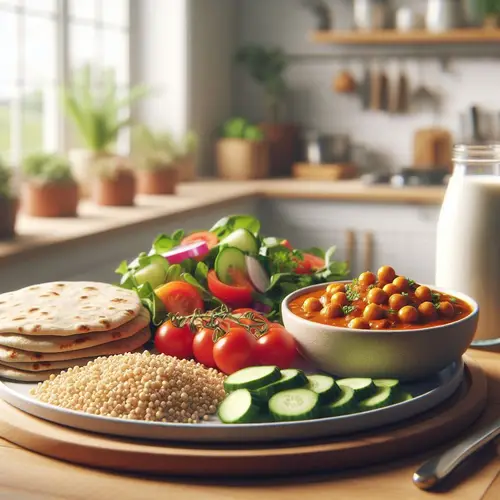vitamins and minerals
Consuming adequate vitamins and minerals is essential for maintaining good health and well-being. In combination with a well-balanced proportion of macronutrients, micronutrients enable the body to perform vital biochemical reactions and processes that are necessary for growth, development, and daily functioning. For example, calcium and vitamin D work together to support bone health, while iron enables red blood cells to transport oxygen efficiently. Antioxidants like vitamins C and E help limit oxidative damage to cells and tissues. B vitamins are needed for energy metabolism and nervous system function. Minerals like magnesium, zinc, and selenium act as cofactors for hundreds of enzymes in the body. Eating a varied, balanced diet with plenty of fruits, vegetables, whole grains, beans, nuts, and seeds provides several vitamins and minerals critical for optimal health. Deficiencies can lead to illness and conditions like anemia, osteoporosis, and scurvy. Making sure to meet daily recommended intakes of these essential vitamins and minerals through diet is crucial for maintaining wellness.
A well-balanced diet should meet all the daily requirements for vitamins and minerals.
MINERALS
CALCIUM
Function: Calcium is crucial for building and maintaining strong bones and teeth. It also involves muscle contractions, nerve transmission, cardiovascular function, and hormone secretion.
Recommended Daily Intake: For adults ages 19-50, the RDI for calcium is 1000 mg per day. For ages 51-70, the RDI increases to 1200 mg per day.
Dietary Sources: Some of the sources of calcium include:
- Tofu: Half a cup provides about 500 mg of calcium depending on how it’s prepared. Choose tofu coagulated with calcium sulfate for the highest calcium content.
- Almonds: 1 ounce (about 23 almonds) provides 75 mg of calcium.
- White beans: Half a cup cooked provides about 100 mg of calcium.
- Broccoli: 1 cup cooked provides about 60 mg of calcium.
- Oranges: 1 medium orange contains about 70 mg of calcium.
- Figs: Dried figs provide 120-140 mg calcium per 1/4 cup.
- Fortified plant milks: 1 cup contains 200-500 mg calcium depending on the brand. Look for soy, almond, oat, or rice milks fortified with calcium carbonate or calcium citrate.
- Kale: 1 cup cooked kale has about 100 mg calcium.
- Tahini: 2 tablespoons provides 130 mg of calcium.
To meet calcium needs on a diet, aim for 3-4 servings daily of these high-calcium foods. Calcium is absorbed better when split into smaller doses throughout the day.
PHOSPHORUS
Function: Phosphorus works closely with calcium for bone and tooth formation. It is also needed for cell structure, energy production, and the synthesis of proteins and lipids.
Recommended Daily Intake: The RDI for phosphorus is 700 mg per day for adults.
Dietary Sources: Phosphorus is abundant in many plant foods, including:
- Seeds: 1 ounce of pumpkin, squash, or sesame seeds contains 150-300 mg phosphorus.
- Beans: 1 cup cooked beans (navy, pinto, kidney) provides 200-400 mg.
- Tofu: 1/2 cup firm tofu provides about 150 mg phosphorus.
- Nuts: 1 ounce almonds or peanuts provides 85-110 mg.
- Whole grains: Oats, brown rice, quinoa, and whole wheat pasta/bread provide 60-150 mg phosphorus per cooked cup.
- Fruit: Avocados are a great source with 1 whole fruit providing about 60 mg. Dried fruits also provide phosphorus.
- Vegetables: Mushrooms, sweet potatoes, broccoli, and spinach contain 30-60 mg per cooked cup.
With a variety of whole plant foods, it’s easy to meet the RDI for phosphorus on a vegan diet. Absorption can be reduced by phytic acid in foods like beans, seeds, and grains, but soaking, sprouting, and leavening can help increase bioavailability.
POTASSIUM
Function: Potassium is important for fluid balance, nerve transmission, and muscle contraction. It also helps move nutrients into cells and waste products out of cells.
Recommended Daily Intake: The RDI for potassium is 4700 mg per day for adults.
Dietary Sources: Many fruits and vegetables are excellent sources of potassium:
- Potatoes: 1 medium baked potato with skin provides 950 mg potassium.
- Bananas: 1 medium banana contains about 450 mg.
- Sweet potato: 1 medium cooked sweet potato has 550 mg.
- Leafy greens: 1 cup cooked spinach provides 540 mg. Kale, swiss chard, and beet greens also contain 300-700 mg per cup.
- Beans: 1 cup cooked beans (white, lima, kidney) has 700-950 mg.
- Apricots: 1/2 cup dried apricots contains 600 mg potassium.
- Tomatoes and tomato products are also high in potassium, providing 200-500 mg per cup.
- Nutritional yeast: 2 tablespoons contains 300-400 mg potassium.
Aim for 4-5 servings of potassium-rich fruits and vegetables daily, such as 1 banana, 1 potato, and 1 cup each of leafy greens, beans, and tomato sauce. This provides enough potassium for a 2000 calorie diet.
SODIUM
Function: Sodium is important for fluid balance, muscle contraction, and nerve transmission. It also helps transport nutrients into cells.
Recommended Daily Intake: The RDI for sodium is 1500mg per day for adults. However, the American Heart Association recommends limiting to 2300mg daily.
Dietary Sources: Most people get adequate sodium, but it’s important to focus on healthy sources on a diet:
- Sea vegetables: 1 sheet nori contains about 30mg sodium. Kelp and other seaweeds also provide small amounts.
- Vegetable broth: Low sodium vegetable broth has about 150mg per cup.
- Olives: 100g of olives contains 200mg sodium.
- Celery: 1 stalk of celery has about 35mg sodium.
- Tomato products: Tomatoes, pasta sauce and ketchup contain sodium naturally, about 10-20mg per 1/2 cup.
- Salt: Rock salt or himalayan salt can be used sparingly in cooking or at the table.
Aim for less than 2300mg of sodium daily by focusing on whole foods over processed items. Limit high sodium plant meats and cheeses. Flavor foods with herbs, spices, garlic and onion instead of table salt. Drink plenty of water to maintain fluid balance.
CHLORIDE
Function: Chloride works together with sodium and potassium to maintain proper fluid balance and support nerve transmission and muscle contraction. It’s also needed to produce stomach acid.
Recommended Daily Intake: The RDI for chloride is 2300mg per day for adults.
Dietary Sources: Good sources of chloride include:
- Seaweed: Just 1 g of dulse seaweed provides 250mg chloride. Kelp, nori, and other sea veggies also provide chloride.
- Rye flour: 1 cup provides 282mg chloride. Other whole grain flours like whole wheat also contain some.
- Tomatoes: 1 cup of tomatoes contains 30mg chloride.
- Olives: 100g of olives provides 175mg chloride.
- Vegetable broth: Low sodium vegetable broth has about 250mg chloride per cup.
- Celery: 1 medium stalk contains 55mg.
- Table salt: Most chloride comes from sodium chloride (salt). But limiting added salt provides less than 500mg chloride.
On a low sodium diet, aim for 2-3 servings per day of foods like seaweed, olives, tomatoes, broth, and rye flour to meet chloride needs of around 2300mg daily. This ensures proper fluid balance is maintained on a sodium restricted diet.
MAGNESIUM
Function: Magnesium is important for muscle and nerve function, blood glucose control, protein synthesis, bone health, immunity, and heart health. It’s involved in over 300 enzyme reactions in the body.
Recommended Daily Intake: The RDI for magnesium is 400-420 mg per day for adults.
Dietary Sources: Some excellent sources include:
- Nuts and seeds: 1 oz of pumpkin, sesame, or flax seeds contains 150-200 mg magnesium. Almonds, cashews and peanuts also provide 75-100 mg per oz.
- Legumes: 1 cup cooked soybeans has 280 mg magnesium. Beans, lentils, and peas provide 60-120 mg per cup.
- Whole grains: Oats, brown rice, millet and quinoa contain around 60-70 mg magnesium per cooked cup.
- Dark leafy greens: 1 cup raw spinach has 80 mg magnesium. Kale, swiss chard and beet greens provide 75 mg per cooked cup.
- Avocados: 1 medium avocado has about 60 mg.
- Banana: 1 medium banana contains about 37 mg.
Aim for 3-4 servings of magnesium-rich foods like nuts, beans, greens, and whole grains daily. Soaking beans and grains can increase magnesium absorption. A varied diet should provide adequate magnesium.
IRON
Function: Iron is an essential mineral that carries oxygen to all cells in the body. It is needed to make hemoglobin, a protein found in red blood cells.
Recommended Daily Intake: The RDI for iron is 8 mg for men and 18 mg for premenopausal women per day.
Dietary Sources: Good sources of iron include:
- Lentils: 1 cup cooked provides 6.6 mg iron.
- Spinach: 1 cup cooked provides 6.4 mg iron.
- Tofu: Half a cup provides 3.4 mg iron.
- Potatoes: One medium baked potato with skin contains 3.2 mg iron.
- Cashews: 1 ounce provides 2 mg iron.
- Chickpeas: 1 cup cooked has 2.4 mg iron.
- Prune juice: 1 cup contains 2.3 mg iron.
- Blackstrap molasses: 1 tbps provides 3.2 mg iron.
- Fortified cereals and plant milks also provide iron.
Eating iron-rich foods along with vitamin C foods like oranges, tomatoes, and bell peppers enhances iron absorption. Avoid coffee and tea with meals to limit inhibition of iron absorption.
Aim for 2-3 servings of iron-rich foods like lentils, spinach, and cashews per day to meet needs on a diet. Soaking and sprouting beans, grains, and seeds boosts iron bioavailability as well.
ZINC
Function: Zinc is essential for immune function, wound healing, protein synthesis, DNA production, and cell division. It also supports taste, smell, and vision.
Recommended Daily Intake: The RDI for zinc is 11 mg per day for adult men and 8 mg per day for adult women.
Dietary Sources: Good sources include:
- Legumes: 1 cup cooked lentils contains 2.5 mg zinc. Similar amounts in chickpeas, beans, peas.
- Nuts and seeds: 1 ounce pumpkin seeds has 2 mg zinc. Cashews and almonds also contain zinc.
- Oats: 1 cup cooked oatmeal contains 2.2 mg. Other whole grains like wheat germ also provide zinc.
- Tofu: Half a cup contains 1-2 mg zinc depending on coagulant used.
- Dark chocolate: 1 ounce provides 1-2 mg zinc.
- Nutritional yeast: 2 tablespoons contains about 1 mg zinc.
Soaking nuts, seeds, legumes, and whole grains helps increase zinc bioavailability. Pairing zinc-rich foods with citrus fruits can also enhance absorption. Aim for 2-3 servings of zinc-containing foods like lentils, pumpkin seeds, and oats per day to meet needs on a diet.
IODINE
Function: Iodine is a mineral that is essential for thyroid hormone production and metabolism regulation. Thyroid hormones control growth, development, and metabolic rate.
Recommended Daily Intake: The RDI for iodine is 150 micrograms per day for adults.
Dietary Sources: Good vegan sources include:
- Seaweed: Just 1 gram of dried kelp contains about 1600 mcg iodine. Hijiki, nori, wakame also provide significant amounts.
- Iodized salt: 1/4 teaspoon contains about 95 mcg iodine. Use sparingly to avoid excess sodium.
- Dairy replacements: 1 cup soy or almond milk fortified with iodine provides about 90 mcg.
- Baked potatoes: 1 medium potato with skin provides 60 mcg iodine.
- Prunes: 5 prunes contain 13 mcg iodine.
- Strawberries: 1 cup contains 13 mcg iodine.
Seaweed can provide extremely high amounts of iodine, so it should be eaten in moderation, about 1-2 servings per week. Getting reliable amounts of iodized salt, fortified plant milks, potatoes, and prunes daily helps meet iodine needs on a vegan diet.
SELENIUM
Function: Selenium is an essential mineral that acts as an antioxidant, helping to protect cells from oxidative damage. It is important for thyroid hormone metabolism, DNA production, and immune function.
Recommended Daily Intake: The RDI for selenium is 55 micrograms per day for adults.
Dietary Sources: Good vegan sources of selenium include:
- Brazil nuts: Just 1 Brazil nut provides about 95 mcg selenium.
- Oats: 1 cup cooked oats contains 34 mcg.
- Brown rice: 1 cup cooked brown rice provides 19 mcg.
- Beans: 1 cup cooked lentils, chickpeas or kidney beans contains 5-8 mcg selenium.
- Seeds: 1 ounce of chia seeds, flaxseeds or sunflower seeds provides 15-30 mcg.
- Mushrooms: 1 cup cooked crimini or shiitake mushrooms has some selenium.
- Tofu: 1/2 cup firm tofu contains about 13 mcg selenium.
- Garlic: 1 clove of garlic provides 3 mcg selenium.
Eating 2-3 servings of selenium-rich foods like oats, brown rice, beans, seeds, and Brazil nuts daily can help meet recommended intakes on a vegan diet. Selenium from plant foods is well absorbed by the body.
COPPER
Function: Copper helps with iron absorption, red blood cell formation, immune function, nerve transmission, connective tissue formation, and energy production.
Recommended Daily Intake: The RDI for copper is 900 mcg per day for adults.
Dietary Sources: Good sources of copper include:
- Seeds: 1 ounce pumpkin, sesame or sunflower seeds contains 500-900 mcg copper.
- Beans: 1 cup cooked lentils, chickpeas, white beans or tofu provides 300-500 mcg.
- Nuts: 1 ounce cashews, pine nuts or peanuts has 200-300 mcg copper.
- Potatoes: 1 medium baked or sweet potato with skin provides 200-250 mcg.
- Mushrooms: 1 cup cooked shiitake mushrooms provides about 300 mcg.
- Avocados: 1 medium avocado has 135 mcg copper.
- Dark Chocolate: 1 ounce of 70-85% cocoa chocolate provides 200-300 mcg copper.
- Blackstrap Molasses: 1 tablespoon contains 135 mcg copper.
Eating 3-5 servings of high copper plant foods like seeds, beans, potatoes, nuts, avocado, and mushrooms can help meet daily copper needs on a vegan diet. Absorption is enhanced by vitamin C from fruits and vegetables.
MANGANESE
Function: Manganese is a mineral that assists with bone formation, metabolism, antioxidant function, and wound healing. It activates many enzymes and is essential for normal brain and nerve function.
Recommended Daily Intake: The RDI for manganese is 2.3 mg per day for adult men and 1.8 mg per day for adult women.
Dietary Sources: Good sources of manganese include:
- Whole grains: 1 cup cooked brown rice contains 1.2 mg manganese. Oats, millet, and quinoa also provide around 1 mg per cup.
- Legumes: 1 cup cooked lentils has 0.7 mg manganese. Soybeans, chickpeas, and beans also contain manganese.
- Nuts and seeds: 1 ounce pumpkin, sesame and pine nuts contains 0.5-0.7 mg manganese.
- Leafy greens: 1 cup raw spinach has 0.6 mg. Kale, collards and other greens also provide manganese.
- Tea: Black tea contains 0.4-0.5 mg manganese per cup.
- Pineapple: 1 cup fresh pineapple has about 0.75 mg manganese.
Aim for 2-3 servings of manganese-rich whole grains, nuts, seeds, legumes and greens per day. Absorption is increased by vitamin C from citrus fruits and tomatoes. Manganese from plant foods is readily used by the body to meet daily needs.
CHROMIUM
Function: Chromium is a trace mineral that enhances the action of insulin, helping regulate blood glucose levels. It also plays a role in metabolizing fats, carbs, and protein.
Recommended Daily Intake: The RDI for chromium is 35 mcg per day for adult men and 25 mcg per day for adult women.
Dietary Sources: Good sources include:
- Broccoli: 1 cup cooked broccoli contains about 22 mcg chromium.
- Potatoes: 1 medium baked potato with skin provides 18 mcg.
- Oats: 1 cup cooked oatmeal contains 8 mcg chromium.
- Beans: 1 cup cooked lentils, chickpeas or black beans contains 6-8 mcg chromium.
- Tomatoes: 1 cup raw cherry tomatoes has 11 mcg chromium.
- Barley: 1 cup cooked barley has 6 mcg chromium.
- Fruits like apples, bananas and oranges also provide small amounts of chromium.
- Whole wheat bread: 2 slices provide 6-8 mcg chromium.
Getting adequate fiber from whole plant foods helps increase chromium absorption. Eating 2-3 servings of chromium-rich foods like broccoli, potatoes, oats and beans per day can help meet recommended intakes on a vegan diet.
Vitamins
Vitamin A
Function: Vitamin A is important for eye health, immune function, growth and development, and reproductive health. It acts as an antioxidant and helps maintain healthy skin and tissues.
Recommended Daily Intake: The RDI for vitamin A is 900 mcg RAE (retinol activity equivalents) per day for adult men and 700 mcg RAE per day for adult women.
- Dietary Sources: Plant foods contain provitamin A carotenoids that the body converts into retinol. Good sources include:
- Sweet potatoes: 1 medium baked sweet potato with skin provides over 100% RDI at 1096 mcg RAE.
- Carrots: 1 cup raw carrots has about 400 mcg RAE.
- Kale: 1 cup cooked kale provides 330 mcg RAE.
- Spinach: 1 cup cooked spinach has 270 mcg RAE.
- Cantaloupe: 1 cup diced cantaloupe has 135 mcg RAE.
- Apricots: 1 cup diced apricots contains 96 mcg RAE.
- Broccoli: 1 cup cooked broccoli has 60 mcg RAE.
Aim for 2-3 servings daily of vitamin A rich foods like sweet potatoes, carrots, greens, cantaloupe, apricots. Absorption is enhanced by cooking and healthy fats. Getting enough zinc also helps with vitamin A utilization.
Vitamin C
Function: Vitamin C is an antioxidant that helps make collagen, absorb iron, support immunity, and protect cells from damage. It also aids in wound healing.
Recommended Daily Intake: The RDI for vitamin C is 90 mg per day for adult men and 75 mg per day for adult women.
Dietary Sources: Many fruits and vegetables are high in vitamin C:
- Red peppers: 1 cup raw red bell pepper contains 190 mg vitamin C.
- Orange juice: 1 cup 100% orange juice has 124 mg vitamin C.
- Kiwi: 1 kiwi fruit has 64 mg vitamin C.
- Broccoli: 1 cup cooked broccoli contains 51 mg vitamin C.
- Strawberries: 1 cup sliced strawberries has 85 mg vitamin C.
- Tomatoes: 1 cup cherry tomatoes provides 27 mg vitamin C.
- Potatoes: 1 medium baked potato with skin has 17 mg.
- Cantaloupe: 1 cup diced cantaloupe contains 62 mg vitamin C.
Aim for 2-3 servings of vitamin C foods daily like oranges, red peppers, kiwi, broccoli, strawberries and tomatoes. Cooking reduces vitamin C content, so eat some raw fruits and veggies too. Vitamin C is sensitive to heat, light, and oxygen.
Vitamin D
Function: Vitamin D helps the body absorb calcium and phosphorus. It supports bone health, immune function, cell growth, neuromuscular functioning, and reduction of inflammation.
Recommended Daily Intake: The RDI for vitamin D is 600 IU (15 mcg) per day for adults.
Dietary Sources: There are few natural food sources of vitamin D. The best options are:
- Sunlight: The body synthesizes vitamin D when skin is exposed to UVB rays. About 10-15 minutes of midday sun twice weekly provides adequate vitamin D for most people.
- Mushrooms: UV-exposed mushrooms provide 100-130 IU vitamin D per 3 ounces. Choose maitake, portobello, morel, chanterelle mushrooms.
- Fortified foods: Many milk alternatives and cereals are fortified with vitamin D, providing about 25–120 IU per serving.
- Supplements: Vitamin D3 supplements are often needed to reach optimal intake, especially in winter. The Vegan Society recommends taking 2000 IU (50 mcg) daily.
To get enough vitamin D on a diet, aim for short sun exposure, fortified foods, and perhaps a vitamin D3 supplement. Get blood levels of 25(OH)D tested to verify optimal vitamin D status.
Vitamin E
Function: Vitamin E is a fat-soluble antioxidant that helps protect cells from damage by neutralizing free radicals. It also supports immune function.
Recommended Daily Intake: The RDI for vitamin E is 15 mg per day for adults.
Dietary Sources: Excellent sources of vitamin E include:
- Almonds: 1 ounce (about 23 almonds) contains 7 mg vitamin E.
- Sunflower seeds: 1 ounce has 6 mg vitamin E.
- Hazelnuts: 1 ounce has 4 mg vitamin E.
- Spinach: 1 cup cooked spinach provides 3 mg vitamin E.
- Avocado: 1 medium avocado has 2 mg vitamin E.
- Kiwi: 1 kiwi fruit provides 1 mg vitamin E.
- Broccoli: 1 cup cooked broccoli has 1 mg vitamin E.
- Olive oil: 1 tablespoon contains 2 mg vitamin E.
Aim for 2-3 servings of vitamin E-rich foods daily, like nuts, seeds, leafy greens, avocado, olive oil. Vitamin E is best absorbed when eaten with healthy fats. Getting adequate selenium also helps support vitamin E activity in the body.
Vitamin K
Function: Vitamin K is important for blood clotting and bone health. It helps activate proteins involved in bone mineralization and calcium binding.
Recommended Daily Intake: The RDI for vitamin K is 120 mcg per day for adult men and 90 mcg per day for adult women.
Dietary sources: The sources are:
- Kale: 1 cup cooked kale provides 530 mcg vitamin K, over 100% of the RDI.
- Spinach: 1 cup cooked spinach has 444 mcg vitamin K.
- Broccoli: 1 cup cooked broccoli has 220 mcg vitamin K.
- Prunes: 1/2 cup prunes provides 40 mcg vitamin K.
- Soybeans: 1 cup edamame contains 35 mcg vitamin K.
- Cucumbers: 1 medium cucumber with peel contains 33 mcg.
- Cabbage: 1 cup raw shredded cabbage has 28 mcg vitamin K.
Aim for 1-2 servings daily of vitamin K-rich foods like leafy greens, broccoli, prunes, and cucumbers. Vitamin K is best absorbed with dietary fats. Getting enough calcium, magnesium, and vitamin D also supports vitamin K function.
Thiamin (B1)
Function: Thiamin is important for converting food into energy. It helps metabolize carbohydrates, proteins, and fats. It’s essential for nerve, heart, muscle, and brain function.
Recommended Daily Intake: The RDI for thiamin is 1.2 mg per day for adult men and 1.1 mg per day for adult women.
Dietary Sources: Good sources include:
- Lentils: 1 cup cooked lentils contains 0.17 mg thiamin.
- Oats: 1 cup cooked oatmeal provides 0.4 mg.
- Brown rice: 1 cup cooked brown rice has 0.2 mg.
- Soybeans: 1 cup boiled soybeans contains 0.4 mg thiamin.
- Sunflower seeds: 1 ounce has 0.25 mg thiamin.
- Potatoes: 1 medium baked potato with skin provides 0.15 mg.
- Green peas: 1 cup cooked peas has 0.19 mg thiamin.
- Nutritional yeast: 1 tablespoon contains 0.2 mg thiamin.
Eating 3-5 servings daily of thiamin-rich foods like grains, legumes, seeds, potatoes, and nutritional yeast helps meet needs for this B vitamin. Soaking and sprouting foods increases thiamin content as well.
Riboflavin (B2)
Function: Riboflavin helps convert food into energy. It is important for cellular function, growth and development, production of red blood cells, and maintaining vision and skin health.
Recommended Daily Intake: The RDI for riboflavin is 1.3 mg per day for adult men and 1.1 mg per day for adult women.
Dietary Sources: Good sources of riboflavin include:
- Almonds: 1 ounce contains 0.3 mg riboflavin.
- Mushrooms: 1 cup cooked crimini mushrooms has about 0.3 mg.
- Spinach: 1 cup cooked spinach provides 0.2 mg riboflavin.
- Asparagus: 1 cup cooked asparagus has 0.2 mg.
- Broccoli: 1 cup cooked broccoli contains 0.1 mg.
- Soy milk: 1 cup fortified soy milk has 0.4 mg riboflavin.
- Nutritional yeast: 2 tablespoons has 0.5 mg riboflavin.
Aim for 2-3 servings of riboflavin-rich foods daily like spinach, broccoli, mushrooms, almonds, fortified plant milk, and nutritional yeast. Soaking, sprouting and cooking helps increase riboflavin levels in plant foods.
Niacin (B3)
Function: Niacin helps convert food into energy by aiding enzymes. It’s important for healthy skin, blood circulation, brain health, and DNA production.
Recommended Daily Intake: The RDI for niacin is 16 mg per day for adult men and 14 mg per day for adult women.
Dietary Sources: Good sources of niacin include:
- Peanuts: 1 ounce of peanuts contains 3.8 mg niacin.
- Brown rice: 1 cup cooked brown rice provides 1.8 mg niacin.
- Avocado: 1 medium avocado has 2 mg niacin.
- Mushrooms: 1 cup cooked shiitake mushrooms provides 2.5 mg niacin.
- Green peas: 1 cup cooked peas contains 1.2 mg niacin.
- Potatoes: A medium baked potato with skin has 1.9 mg niacin.
- Nutritional yeast: 2 tablespoons contains 6 mg niacin.
Aim for 2-3 daily servings of niacin-rich foods like mushrooms, peas, avocado, peanut, potatoes and nutritional yeast. Combining foods high in tryptophan (beans, nuts, seeds) with vitamin C also boosts niacin levels.
Pantothenic acid (B5)
Function: Pantothenic acid is important for the synthesis of coenzyme A, which is essential for carbohydrate, protein and fat metabolism. It also assists in creating red blood cells and neurotransmitters.
Recommended Daily Intake: The RDI for pantothenic acid is 5 mg per day for adults.
Dietary Sources: Good food sources include:
- Mushrooms: 1 cup cooked shiitake mushrooms provides 2.1 mg pantothenic acid.
- Avocados: 1 medium avocado has 1.4 mg.
- Broccoli: 1 cup cooked broccoli has 1.3 mg.
- Sweet potato: 1 medium cooked sweet potato contains 0.8 mg.
- Sunflower seeds: 1 ounce has 0.5 mg pantothenic acid.
- Spinach: 1 cup cooked spinach provides 0.5 mg.
- Chickpeas: 1 cup cooked chickpeas has 0.9 mg.
- Fortified cereals and plant milks also provide pantothenic acid.
Aim for 3-4 servings daily of pantothenic acid foods like mushrooms, avocado, broccoli, sweet potato, spinach, and chickpeas. Vitamin C helps with absorption. Cooking and soaking legumes increases pantothenic acid levels as well.
Pyridoxine (B6)
Function: Vitamin B6 aids in protein metabolism, red blood cell production, and brain development and function. It also helps the body make neurotransmitters and form membranes around nerve cells.
Recommended Daily Intake: The RDI for vitamin B6 is 1.3 mg per day for adults.
Dietary Sources: Good sources include:
- Potatoes: 1 medium baked potato with skin contains 0.4 mg vitamin B6.
- Bananas: 1 medium banana has 0.5 mg.
- Chickpeas: 1 cup cooked chickpeas has 0.5 mg vitamin B6.
- Pistachios: 1 ounce pistachios contains 0.5 mg.
- Winter squash: 1 cup cooked squash provides 0.25 mg.
- Spinach: 1 cup cooked spinach has 0.15 mg vitamin B6.
- Avocado: 1 medium avocado has 0.4 mg vitamin B6.
Aim for 2-3 servings of vitamin B6 foods like potatoes, bananas, chickpeas, pistachios, squash, and spinach. Fermenting and soaking helps increase vitamin B6 in plant foods.
Biotin (B7)
Function: Biotin assists enzymes in fatty acid synthesis, branched-chain amino acid catabolism, and gluconeogenesis. It plays a key role in metabolizing fats, carbohydrates, and protein for energy production.
Recommended Daily Intake: The RDI for biotin is 30 mcg per day for adults.
Dietary Sources: Good sources of biotin include:
- Almonds: 1 ounce contains 6 mcg biotin.
- Sweet potato: 1 medium baked sweet potato has 3 mcg.
- Spinach: 1 cup raw spinach has 0.5 mcg biotin.
- Carrots: 1 cup raw carrots contains 0.4 mcg.
- Mushrooms: 1 cup raw crimini mushrooms has 0.5 mcg.
- Avocado: 1 medium avocado provides 3.5 mcg biotin.
- Cauliflower: 1 cup raw cauliflower has 0.4 mcg.
- Nutritional yeast: 1 tablespoon contains 30 mcg biotin.
Eating 3-5 servings daily of biotin-rich foods like sweet potatoes, almonds, spinach, carrots, avocado and nutritional yeast helps meet biotin needs on a diet.
Folate (B9)
Function: Folate is crucial for new cell production and growth. It helps form DNA and RNA, produce red blood cells, and synthesize amino acids. It also aids brain development and function.
Recommended Daily Intake: The RDI for folate is 400 mcg per day for adults.
Dietary Sources: Good sources of folate include:
- Lentils: 1 cup cooked lentils contains 358 mcg folate, close to 100% RDI.
- Asparagus: 1 cup cooked asparagus has 262 mcg folate.
- Spinach: 1 cup cooked spinach has 131 mcg folate.
- Broccoli: 1 cup cooked broccoli contains 84 mcg.
- Avocado: 1 medium avocado provides 59 mcg folate.
- Orange: 1 medium orange contains 74 mcg folate.
- Beans and peas: 1 cup cooked beans or peas has >100 mcg.
Aim for 2-3 servings daily of high-folate foods like lentils, asparagus, spinach, oranges, and avocado. Vitamin C from fruits and vegetables enhances folate absorption.
Cobalamin (B12)
Function: Vitamin B12 supports red blood cell formation, neurological function, and DNA synthesis. It also aids in metabolizing fats and carbohydrates.
Recommended Daily Intake: The RDI for vitamin B12 is 2.4 mcg per day for adults.
Dietary Sources:
Animal products like meat, eggs, and dairy are the natural sources of vitamin B12. Some options include:
- Beef liver: 3 ounces contains over 1000 mcg B12
- Salmon: 3 ounces wild salmon provides 4.9 mcg
- Tuna: 3 ounces of canned tuna has 2.5 mcg
- Eggs: 1 large egg contains 0.6 mcg
- Milk: 1 cup whole milk provides 1.2 mcg
- Cheese: 1 ounce cheddar cheese has 0.9 mcg
For those following plant-based diets, the main sources are fortified foods and supplements:
- Fortified plant milk: 1 cup contains 1.2-4.8 mcg B12
- Nutritional yeast: 2 tbsp fortified Nooch has 3.9 mcg
- Fortified cereals: ~6 mcg per 3/4 cup serving
- B12 supplements: 10-100 mcg per tablet
To meet the RDI on a 2000 calorie diet, consuming animal products like eggs, dairy and seafood 2-3 times per week generally provides adequate B12. Those on plant-based diets need fortified foods and/or a supplement to get the recommended 2.4 mcg.
2000 calories sample diet
Breakfast (400 calories)

- 1 cup oatmeal cooked in water (300 calories, 55g carbs, 10g protein)
- 1 medium banana (105 calories, 27g carbs)
- 1 tbsp ground flaxseed (25 calories, 2g fat)
Mid Morning Snack (200 calories)

- 1 ounce almonds (170 calories, 6g protein, 15g fat)
- 1 clementine orange (35 calories, 9g carbs)
Lunch (500 calories)

- Tofu veggie stir fry with 1/2 cup tofu, 1 cup broccoli, 1 carrot, 2 cups spinach, 1 tbsp sesame oil (500 calories, 35g protein, 26g fat, 40g carbs)
Mid Afternoon Snack (200 calories)

- 1 medium apple (95 calories, 25g carbs)
- 1 tbsp natural peanut butter (105 calories, 4g protein, 8g fat)
Dinner (700 calories)

- 1 cup cooked quinoa (222 calories, 8g protein, 44g carbs)
- 1 cup chickpea curry with vegetables (230 calories, 12g protein, 7g fat, 30g carbs)
- Side salad with 2 cups greens, tomatoes, cucumbers (50 calories, 6g carbs)
- 1 whole wheat chapati (98 calories, 3g protein, 18g carbs)
- 1 cup lowfat milk (102 calories, 8g protein, 12g carbs)
